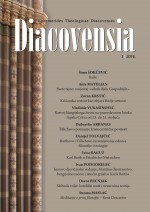POSVEĆIVANJE STVORENJA U VREMENU EKOLOŠKA TEOLOGIJA ABRAHAMA JOSHUE HESCHELA
THE SANCTIFICATION OF CREATION IN TIME. THE ECOLOGICAL THEOLOGY OF
ABRAHAM JOSHUA HESCHEL
Author(s): Željko Tanjić, Đurica PardonSubject(s): Jewish Thought and Philosophy, Philosophy of Religion, Environmental interactions, Biblical studies
Published by: Katolički bogoslovni fakultet u Đakovu
Keywords: ecological theology; Shabbat; Judaism; created world; time; space; holiness;
Summary/Abstract: The world, which today’s generation of people lives in, is threatened and in constant danger of destruction, noted Abraham Joshua Heschel, at the mid-twentieth century, and for the salvation of man and the environment of his life suggested a different value system that takes into account not only space, but as the essence and the heart of existence sets time. Judaism, as a religion of time, teaches how consecration of time happens in celebration of Shabbat, the Day of the Lord, which God has blessed and made holy. Heschel’s ecological theology considers the world of things as sacred, but only if the world is consecrated in time. Therefore, A. J. Heschel sees the Shabbat as a starting point from which he observes the world and from which he builds his ecological theology, considering the Day of the Lord as the pinnacle of creation and highest manifestation of God’s holiness, when primarily the time, then a man and finally space is made holy. This paper as a starting point of analysis takes the book »The Sabbath: Its Meaning for Modern Man« by Abraham Joshua Heschel in effort to provide an overview of the beginnings of ecological and theological thinking in the mid 20th century.
Journal: Diacovensia: teološki prilozi
- Issue Year: 21/2013
- Issue No: 2
- Page Range: 353-377
- Page Count: 25
- Language: Croatian

